100
|
The Daughters
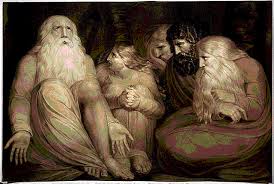
of Job
a Charismatic
Tradition
The artistic picture above is drawn or painted of the Patriarch
Job, his wife, and the three counsellors or wise men with whom he
debates throughout the 42 chapters of the Book of Job,
which appears in the Old Testament of the King James Bible
after the book of Esther and just previous to the Book of
Psalms.
Until modern times and intensified form criticism by modern
theologians the Book of Job was considered to be one of the
oldest books in the Bible because it was not seen as an allegory
but as a literal historical account of a time before Moses
and even perhaps before the Flood of Noah, because it begins
with a time during which Satan is accepted as a Son of God
and is alllowed to roam about the earth and tempt people as the
Ruler of this Earth. And was still allowed in heaven as the
representative of this earth.
However, allegorically at least, Satan still occupies that
position today, so this is far from being conclusive as to when and
where Job was written, as modern theologians are aware.
So now it is thought to be of Persian origin, and its theology
is seen to be basically Zoroasterism,
not Jewish. It is not accepted as part of the Torah but
is located appropriately beside Esther, another Bible book with
a Persian background.

Job 1:6 "Now there
came a day when the sons of God came to present themselves before the
Lord, and Satan came among them."
7 "And the
Lord said unto Satan, Whence comest thou? Then Satan answered
the Lord, and said, From going to and fro in the earth, and from
walking up and down in it."
8 "And the
Lord said unto Satan, hast thou considered my servant Job, that
there is none like him in the earth, a perfect and an
upright man, one that feareth God, and escheweth evil?"
| This
book is designed or written as a debate, or perhaps a drama or
play, and is quite unlike all
of the other books of the Bible, which may be why the Jews have
decided to keep it, to provide some variety and to continue the
debate on the subjects presented. Although the
arguments presented are not always consistent with surviving
Jewish theology.
One cannot, for example, relate Job to any of the other Bible
Patriarchs in any meaningful way. And Satan plays a
much bigger role here than anywhere else in the Jewish Old
Testament Bible.
The
New Testament, however, is another matter. And Satan plays a
much larger role as the major adversary to Jesus, who is presented
as the one who will win back the earth for God, although in Job,
God never really lost the Earth, Job, having survived his TESTS if not
spotless, at least still judged as God's representative at that
time.

Factoring in the later
additions to the doctrine of Satan and the continuing war of God
against Evil, Light against Darkness, Christ against Satan, we
have now this scenario, not fully developed when Job was
composed, somewhere in Persia, by an unknown Persian author.
 |
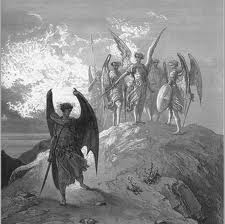 |
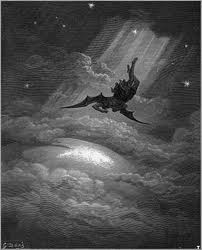 |
| Satan as
one of God's sons or angels, is allowed to tempt people and
angels in both heaven and on earth. |
Satan or
Lucifer causes war in heaven, and God's unique Son,
Jesus Christ, casts Satan out of heaven. He takes 1/3 of
angels with him. Rev. 12 |
Satan, no
longer allowed in heaven, arrives on earth and tempts Adam and
Eve, newly created, to join his revolt. |
|
Job,
the Perfect Man

Survives His Test by SATAN
| Job 1:1 "There was a man
in the land of Uz (a part of northern Arabia), whose name was Job:
and that man was perfect and upright, and one that feared God, and
eschewed evil." 2
"And there were born unto him seven sons and three daughters. 3 "His
substance also was seven thousand sheep, and three thousand camels,
and five hundred yoke of oxen, and five hundred she asses, and a
very great household; so that this man was the greatest of all the
men of the east."
4 "And his sons went and
feasted in their houses, every one his day; and sent and called for
their three sisters to eat and drink with them."
5 "And it was so, when the
days of their feasting were gone about, that Job sent and sanctified
them, and rose up early in the morning, and offered burnt offerings
according to the number of them all: for Job said, It may be that
one of my sons has sinned, and cursed God in their hearts.
Thus did Job continually."
| It's at this
point that the author of Job introduces the word-picture of
Satan showing up in heaven, claiming by his actions to be master
of the entire earth, and God protests that the existence of Job
on earth shows this is not really the case. The Pilgrim
Bible suggests that this is really a drama or play
written in poetry, and it was written to consider the problem of
"Why do the righteous suffer and the wicked prosper?" I'll
note here that many of David's Psalms are obviously dealing with
this same ethical and religious problem. |
|
| 9 "Then Satan answered
the Lord, and said, Doth Job fear God for nought?"
10 "Hast not thou made an hedge
about him, and his house, and about all that he hath on every side?
thou hast blessed the work of his hands, and his substance is
increased in the land."
11 "But put forth thine
hand now, and touch all that he hath, and he will curse thee to thy
face."
12 "And the Lord said unto
Satan, Behold, all that he hath is in thy power; only upon himself
put not forth thine hand. So Satan went forth from the
presence of the Lord."
13 "And there was a day
when his sons and his daughters were eating and drinking wine in
their eldest brother's house: 14 "And there came a messenger
unto Job, and said, The oxen were plowing, and the asses feeding
beside them: 15 "And the Sabeans fell upon them, and took them away;
yea, they have slain the servants with the edge of the sword; and I
only have escaped alone to tell thee."
16 "While he was yet
speaking, there came also another, and said, The fire of God is
fallen from heaven, and hath burned up the sheep, and the servants,
and consumed them, and I only am escaped alone to tell thee."
17 "While he was yet
speaking, there came also another, and said, The Chaldeans made out
three bands, and fell upon the camnels, and have carried them away,
yea, and slain the servants with the edge of the sword; and I only
am escaped alone to tell thee."
18 "While he was yet
speaking, there came also another, and said, Thy sons and thy
daughters were eating and drinking wine in their eldest brother's
house: 19 "And behold, there came a great wind from the
wilderness, and smote the four corners of the house, and it fell
upon the young men, and they are dead, and I only am escaped alone
to tell thee."
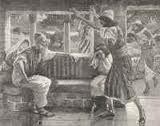
Job 1:20 "Then Job arose, and rent his mantle,
and shaved his head, and fell down upon the ground, and worshipped."
21 "And said, Naked came
I out of my mother's womb, and naked shall I return thither: the
Lord gave, and the Lord hath taken away; blessed be the name of the
Lord."
22 "In all this Job sinned not, nor charged God foolishly." |
|
 |
Job 2:1 "Again
there was a day when the sons of God came to present themselves before
the Lord, and Satan came also to present himself before the Lord."
2 "And the Lord said
unto Satan, From whence comest thou? And Satan answered the Lord, and
said, From going to and fro in the earth, and from walking up and down
in it." |
| 3 "And the Lord said unto Satan,
Hast thou considered my servant Job, that there is none like him in
the earth, a perfect and an upright man, one that feareth God, and
escheweth evil? and still he holdeth fast his integrety, although
thou movest me against him, to destroy him without a cause."
4 "And Satan answered the
Lord, and said, Skin for skin, yea, all that a man hath will he give
for his life. 5 "But put forth thine hand now, and touch his
bone and his flesh, and he will curse thee to thy face. 6 "And the
Lord said unto Satan, Behold, he is in thine hand; but save his
life."
7 "So went Satan forth from
the presence of the Lord, and smote Job with sore boils from the
sole of his foot unto his crown. 8 "And he took him a
potsherd (broken pottery) to scrape himself withal; and he sat down
among the ashes." |
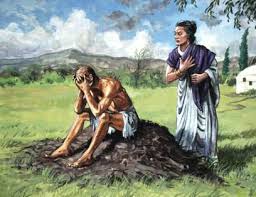
Pictured here also is Job's wife, who was of
no more help to him than his other supposed friends and advisors, who
became known sarcastically as "Job's Comforters". Her
advice in verse 9 "--Dost thou still retain thine integrety? Curse
God, and die."
Now
I'll not subject my viewers to the 40-chapter long religious debate or
play about what this all means, and decide whether or not the question
of "Why do the righteous suffer and the wicked prosper?" is any
closer to being satisfactorily answered by the existence of the Book
of Job, but will zoom to the end of the debate or drama, which is as
follows:
Job 42:12 "So the Lord blessed the latter end
of Job more than his beginning: for he had fourteen thousand sheep, and
six thousand camels, and a thousand yoke of oxen, and a thousand she
asses."
13 "He had
seven sons and three daughters. 14 "And he called the name of the
first, Jemima; and the name of the second, Kezia; and the
name of the third, Keren-happuch."
15 "And
in all the land were no women found SO FAIR as the DAUGHTERS OF JOB: and
their father gave them inheritance among their brethren."
16
"After this lived Job an hundred and forty years, and saw his sons, and
his son's sons, even four generations. 17 "So Job died, being old
and full of days."
THE PILGRIM STUDY BIBLE
comments about Job giving his later-life daughters an inheritance like
his sons (verse 15) "This was most unusual, except in cases where there
were no sons."
I'm seeing an even more
significant meaning here, and that is this -- because no marriages and
grandchildren are mentioned here for these daughters, one can assume
they were Prophetesses, celibate females who dedicated their lives
wholly to the Lord. Which also may be why their names are given
us. They may have been famous in their time, not thought of as
"ordinary people" at all!

And
that appears to have been what the Essenes at Qumran thought
also, because that idea fit right in with their lifestyle.
And indeed there are some of the Dead Sea Scrolls that can be
interpreted to mean that these Daughters of Job were the first to
speak in ecstatic tongues, the so-called language of heaven,
that only God and the angels understand, unless someone, with the
Holy Spirit's help, is able to interpret.
This may be
what Paul, who most certainly knew a lot about the Essenes, was
referring to in 1 Corinthians 14:2 "For he that speaketh in an unknown
tongue tongue speaketh not unto men, but unto God: for no man
understandeth him: howbeit in the spirit he speaketh mysteries.
5 "I would that ye all spake with tongues, but rather that ye
prophesied: for greater is he that prophesieth than he that speaketh in
tongues, except he interpret, that the church may receive edifying."
Testament of Job
The pseudepigraphical
Testament of Job
(ca.100BCE-100AD) contains a conclusion which is believed to
relate to the compiling of the hymnbook used by a Tharapaeutae
community. Job gives one of his daughters "a cord" (a
stringed instrument of some kind?)
"And she took on another heart—no longer minded
toward earthly things—
but ecstatically in the
angelic dialect,
sending up a hymn to God in accord with the style of the angels.
And as she
spoke ecstatically,
she allowed “The Spirit” to be on her garment." (T. Job 48:2-3)
Job’s other daughters likewise took on
“the dialect of archons”, “the dialect
of those and the
“dialect of the cherubim” (T. Job 49:1-50:3). The “cherubim”
are also mentioned
Songs
of the Sabbath Sacrifice
as blessing God (4Q403 1 2, 15, cf. 4Q405 20 2, 3). These angelic
tongues
appear to be coherent, intelligible.
There is parallel description of sung
prophecy among the Therapeutae in
Alexandria
by
Philo, but no mention there of angelic tongues.
Another more commonly known
about Dead Sea Scroll that uses the same "angelic Tongues"
terminology is the one titled ---
Songs of the Sabbath Sacrifice
The texts are fragmentary but appear to relate to
praise tongues:
[...] through the wonderful height [...] tongue of purity [...]
gods (~yhla),
seven [...] 4Q400 3 i, 1-2
...Psalm of praise, on the tongue of the fou[rth]...[Ps]alm
of [tha]nksgiving, on the tongue of the fifth...[Psalm] of
exultation, on the tongue of the sixth...Psalm of [singing, on
the to]ngue of the seventh of the [chief] pri[nces,] a
powerful song [to the God] of ho[lines] with its se[ven]
wo[nd]er[ful songs] 4Q403 1 i, 1-6
Proclaim his glory with the tongue of all who proclaim
knowledge, his wonderful songs with the mouth of all who
proclaim [him. For he is] God of all who sing {knowledge} for
ever, and Judge in his power over all the spirits of
understanding. 4Q403 1 i, 36-37
...The tongue of the first will be strengthened seven times
with the tongue of the second to him....{this is repeated
for the series up to the seventh}... 4Q403 1 2, 27-30
It is not clear whether the angelic tongues are
coherent, intelligible to man. However since
Songs
of the Sabbath Sacrifice
is itself related to sung praise at the Qumran
community, there is a parallel with coherent angelic praise
tongues in
Testament
of Job.
|
pThe
"Daughters of Job" in Masonic Lodges
although Christian
churches have not as yet "discovered" the full potential
for young girls, teenagers, and their mothers inherent
in taking literally the possibilities for their gender
in Job 42:13-15, the Masonic Lodges have.
|
What does this all mean
for you as a
CHRISTIAN?
That's hard to
say! But Dr. Holt, who has made repeated trips over many years time to
Qumran and the Dead Sea Scroll area and caves -- and knows they are real,
and that the Essenes were real, and more important yet to him, knows that
Jesus was born 1 Km. south of the Qumran monastery, it MEANS THAT in all
likelihood --
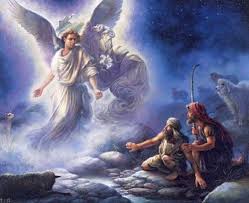
the local
shepherds in the Qumran area were serenaded by the Essene equivalent of the
Daughters
of Job
singing in
ecstatic tongues
quite
similar to what is heard in many Pentecostal churches today
at the
birth of Jesus Christ!
|
NEXT WEB PAGES IN SERIES:
On November 8, 2014 Pastor Erin Miller of the Foster
Seventh-day Adventist Church recognized some similarities of her fellow
church members with the 400 persons who gathered to meet the fleeing David
at the Cave of Adullam.
For Dr. Bob Holt's account--
Click Here!
or, if you prefer skip these pages for now and go
directly to
David's Dance before God's Holy Ark!
Quit and
Return to Main Index |
| |